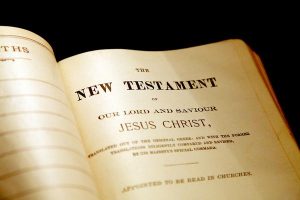Notes on the Origin of the New Testament Canon
The New Testament canon was established early, by Holy Spirit

The New Testament canon was established in the first century by Holy Spirit. Let’s examine some notes on the scriptures which confirm this fact:
2 Peter 1:16-21 – Peter affirms Old Testament prophets wrote God’s word. He puts himself and other apostles in the same category.
2 Peter 3:15-16 – Paul’s letters were on the same level as all the “rest of the scriptures.” That is, inspired of God. Early Greek manuscripts show Paul writing 14 letters.
2 Timothy 3:16-17 – The rest of the scriptures (the Old Testament) are inspired of God. We can broaden this now, and apply the principle to all 66 canonical books as shown below:
1 Timothy 5:18 – Paul quotes Luke 10:7 as scripture, placing it on an equal status with Deuteronomy 25:4.
Therefore, we can reason that if the book of Luke is scripture, then so is Luke’s second volume, Acts. Here’s how:
Luke 1:1-4 – He writes to Theophilus.
Acts 1:1-3 – “In my former book, Theophilus…” (NIV) So he implies Acts is the second volume.
Jude 17 – “But you, my dear friends, must remember what the apostles of our Lord Jesus Christ said.” Jude was apparently referring to Acts 20:29; 1 Timothy 4:1-2; 2 Timothy 3:1-5; 2 Peter 2:1-3; 2 John 7. Apostolic authority carried great weight. The apostles’ writings apparently were considered scripture.
Galatians 1:17-20 – Paul put his own apostleship in the same category as the original twelve apostles. Jesus’ brother James was considered an apostle by this time, and likely their brother Jude was also.
So books by Matthew, John, Paul, Peter, James (Jesus’ brother) and Jude were considered scripture. Mark wrote for Peter. Luke wrote for Paul and interviewed many eyewitnesses.
Increase in the knowledge of God
The Old Testament predicted an increase in the knowledge of God when Christ comes with the new covenant:
- “They will neither harm nor destroy on all my holy mountain, for the earth will be filled with the knowledge of the Lord as the waters cover the sea.” (Isaiah 11:9)
- “I will give them a heart to know me, that I am the Lord. They will be my people, and I will be their God, for they will return to me with all their heart.” (Jeremiah 24:7)
- “‘This is the covenant I will make with the people of Israel after that time,’ declares the Lord. ‘I will put my law in their minds and write it on their hearts. I will be their God, and they will be my people. No longer will they teach their neighbor, or say to one another, ‘Know the Lord,’ because they will all know me, from the least of them to the greatest,’ declares the Lord. ‘For I will forgive their wickedness and will remember their sins no more.'” (Jeremiah 31:33-34)
- “For the earth will be filled with the knowledge of the glory of the Lord as the waters cover the sea.” (Habakkuk 2:14)
Covenants were written
Revelation follows Redemption. The Jews already embraced the idea of a New Testament canon
Deuteronomy 31:9 – Moses wrote it down. Joshua 24:26 – Joshua wrote it down later. Zechariah 7:12 – Others added their books later.
Matthew 4:4, 7, 10 – “It is written.” John 10:35 – “Scripture cannot be set aside.” It was clear to others what was meant by “scripture” or “written” – the 22 or 24 books.
Luke 24:27 – “Beginning with Moses and all the Prophets, he explained… the scriptures.” – The entire Old Testament considered scripture.
Luke 24:44 – “The Law of Moses, the Prophets, and the Psalms.” These are the three sections of the Old Testament. Jesus considered it all scripture.
Jesus viewed the Old Testament as authoritative. (Matthews 4:4; Matthew 4:7; Matthew 4:10)
John 10:35 – Jesus viewed the Old Testament as infallible:
- “The scriptures cannot be altered.” (NLT)
- “Cannot be set aside.” (NIV; NJB; REB)
- “The scriptures cannot be broken.” (HCSB)
Matthew 22:29 – Jesus viewed the Old Testament as inerrant (without error). The scriptures are always right, or correct. Differing views are wrong or incorrect.
Matthew 12:40; Matthew 24:37-38 – Jesus viewed the Old Testament as historically reliable.
Matthew 19:4-5 – Jesus viewed the Old Testament as scientifically accurate.
Matthew 15:3-6 – Jesus viewed the Old Testament as having ultimate supremacy.
Matthew 23:35 – Jesus considered the entire Old Testament from start to finish as scripture.
Matthew 5:17; Matthew 7:12; Luke 16:31; Luke24:27; Luke 24:44 – Jesus quoted and cited all sections of the Old Testament as scripture quoted from all but Judges, Esther and the Song of Solomon.
The Apostles empowered by the Holy Spirit
Luke 24:49; Acts 1:4; Acts 2 – Jesus sent the promised Holy Spirit to empower the apostles.
Ephesians 2:20 – It was through the spirit-led work of the apostles that Jesus would establish the church. Writings received from these apostles were viewed as authoritative.
Others commissioned as apostles
1 Corinthians 9:1; 1 Corinthians 15:8 – Paul got his commission from Jesus a couple of years after Jesus’ resurrection.
Galatians 1:19 – “The only other apostle I met at that time was James, the Lord’s brother.” (NLT)
1 Corinthians 15:7 – “Then he was seen by James and later by all the apostles.” (NLT) So the brothers James and Jude, half brothers of Jesus were considered to be apostles later on.
So as we can see, the New Testament canon was established early by Holy Spirit.